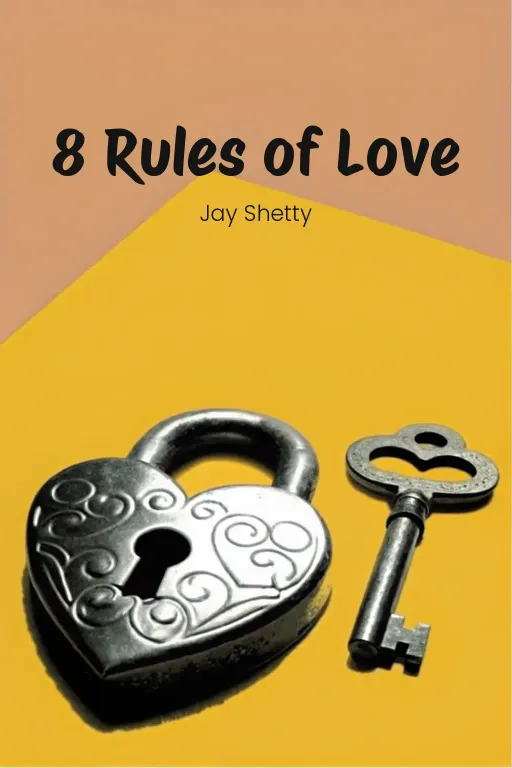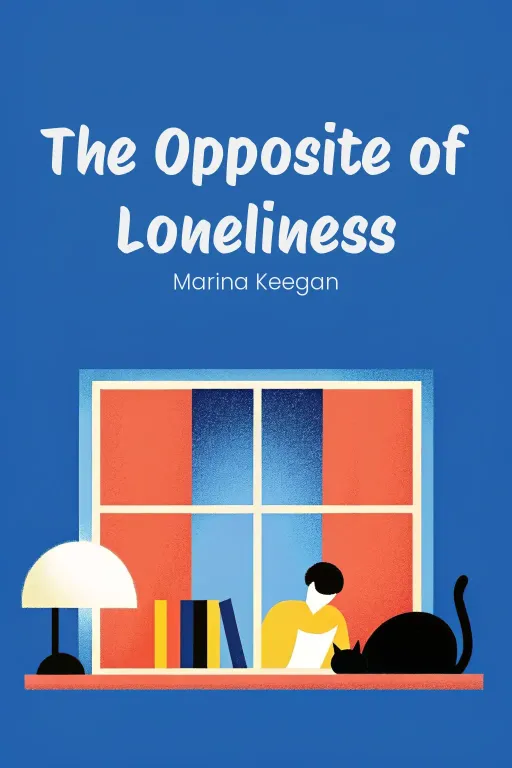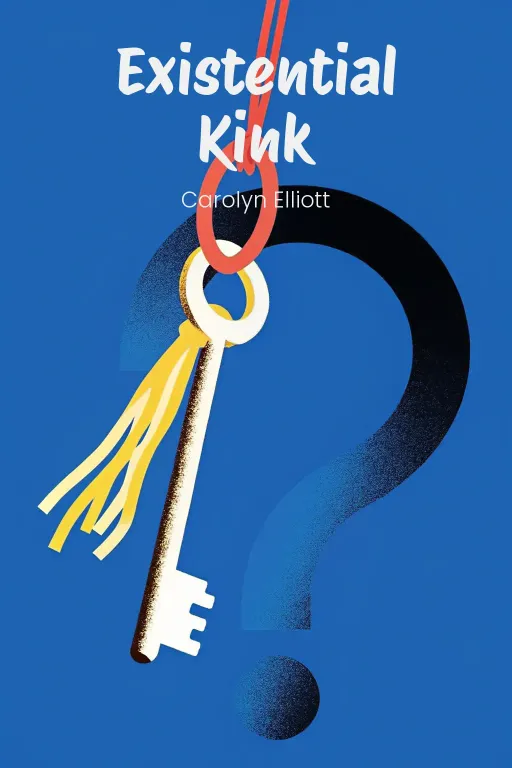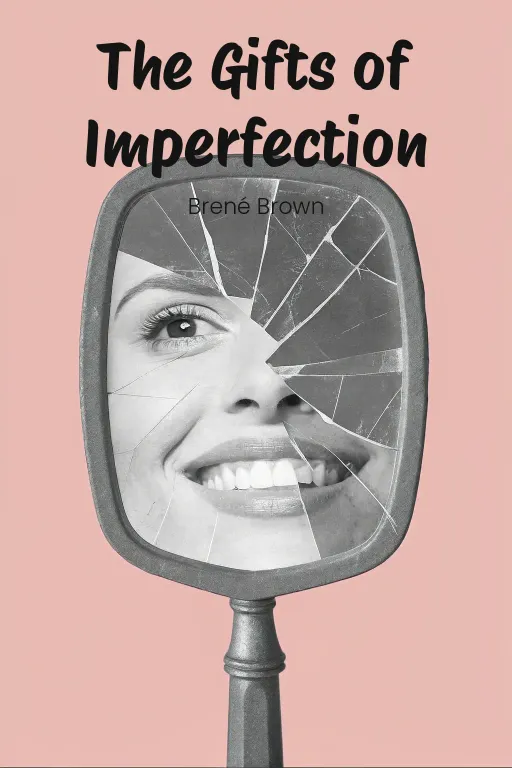
Love's Real Work: Beyond the Hollywood Hype
Podcast by The Mindful Minute with Autumn and Rachel
How to Find It, Keep It, and Let It Go
Introduction
Part 1
Autumn: Hey everyone, welcome! Today we're tackling a topic that's both universal and, let's be honest, pretty confusing: love. And Rachel, before you start picturing cheesy rom-coms... Rachel: Wait, you mean love isn't just a montage of perfect moments set to music? My whole world is crashing down! Alright, Autumn, what's the real deal here? Why should people tune in for this? Autumn: Because love is so much more than just a feeling. It’s a skill you develop, a journey you embark on, and really, a practice. It's something we all crave, but often end up feeling lost or even hurt by. What if I told you the journey of love actually starts way before you even meet that special someone? Rachel: Hmm... So this "practice" starts while I'm home alone on a Friday night, endlessly scrolling? Autumn: Almost! There's this incredible book that breaks love down into stages – think of it like the seasons. Drawing from Vedic philosophy and modern psychology, it starts with understanding who you are, learning to love yourself. Explores how to build healthy relationships. And it ultimately expands love into something even bigger – the connection we all share. Rachel: Sounds ambitious. I'm guessing it’s one of those books that forces you to take a long, hard look in the mirror, maybe a little too close for comfort? Autumn: Exactly. And today, we’re going to unpack three transformative ideas from it. First, we'll dive into solitude – how learning to love yourself becomes the bedrock for building any meaningful connection. Rachel: Ah, yes, the "me" phase. Finally, some justification for talking to my succulents. Please do go on. Autumn: Second, we'll be discussing compatibility: what it “really” takes to cultivate lasting relationships, whether they're romantic or not. Rachel: Translation: we're going to figure out why certain people make us want to swipe left in real life, not just on dating apps? Got it. What's next on the agenda? Autumn: And finally, we're going to explore expanding love to its full potential, beyond just one-on-one connections. Think about it like planting a tree: the roots are self-love, the trunk represents strong relationships, and the branches reach out to embrace, well, everything. Rachel: So, in essence, love is like assembling IKEA furniture: complicated, requires some elbow grease, but ultimately rewarding? Autumn: “Perfect” analogy, Rachel. So, ready to dive in?
Self-Love and Solitude
Part 2
Autumn: Okay, let’s dive right in with where it all starts: solitude and self-love. This is really foundational, because it sets the stage for everything else in our relationships. It's about getting right within yourself before you start connecting with others. Rachel: Exactly! I mean, how can you genuinely offer someone love or form a real connection when you're still sorting through your own emotional baggage? It's like trying to troubleshoot someone else’s tech when your own system is crashing. Autumn: Absolutely. And solitude often gets a bad rap. People think it’s just loneliness, something to avoid. But it’s actually one of the most transformative things we can do. When we intentionally make time to be alone – and I mean really alone, not just scrolling – we create the space to reflect, face our fears, and figure out what truly matters. Rachel: True, isn't there a huge societal pressure to avoid being alone? It’s like we’re taught to constantly fill our time with friends, work, or social media updates. Solitude feels almost…forbidden. Autumn: That's such a good point, Rachel. It’s definitely demonized in our hyper-connected world. But here’s the irony: solitude can actually make our relationships stronger. Research shows that when you make time for yourself, you gain clarity, boost creativity, and develop a deeper understanding of who you are. It's like decluttering your mind. Rachel: Right, so solitude isn’t just sitting around in your pajamas watching Netflix? Autumn: Not exactly. It’s more about consciously turning inward and reflecting. It’s giving yourself the chance to process your emotions without all the distractions. Take Emmett, for instance. He kept ending up in these dead-end relationships, and he thought it was just bad luck. But the truth was, he was terrified of being alone. That fear drove him into relationships that weren’t right for him. Rachel: Let me guess, after his third breakup he finally thought “Ok, maybe I need to take a dating break for a while?” Autumn: Pretty close! He spent several months intentionally embracing solitude. He tried hobbies he always wanted to do, started journaling, and really reflected on himself. He began to see his patterns. He realized that his fear of being alone was causing him to settle for relationships that didn’t meet his emotional needs. Once he had that realization, his confidence soared and he began choosing relationships more intentionally. Rachel: Okay, that's interesting. So, for someone new to this, where do they even start? Just sitting quietly can be…intense. Like, you’re trying to meditate, and suddenly you’re reliving that embarrassing moment from high school. Autumn: Totally! That’s where specific practices come in, like writing a love letter to yourself. I know it sounds a little corny, but it can be incredibly powerful. Think about it: when was the last time you actually acknowledged your own worth, not for what you do, but simply for who you are? Writing things like, “I admire your resilience” or “You’re allowed to make mistakes without losing your value” can be transformative. Rachel: So, in other words, you’re giving yourself the pep talk that you’re always hoping to hear from someone else, but never quite do? Autumn: Exactly. Another great method is solitude meditation. Just picture a peaceful setting, like sitting by a waterfall or walking through a forest. This helps you disconnect from distractions and tune into your thoughts without judgment. Rachel: Yeah, that makes sense. If you can’t stand your own company, how can you expect to show up well for other people without bringing all your drama to the table? Autumn: Precisely! Solitude builds a foundation of clarity and emotional resilience. When you’re aligned with your values and aware of your patterns, you approach relationships from a place of wholeness, instead of neediness. Rachel: Okay, let me challenge that a bit. Isn’t there a point where solitude becomes…self-absorbed? You know, that person who’s always saying, “I don’t need anyone, I’m good on my own.” Where do you draw the line? Autumn: Good question. Solitude isn’t about shutting out the world. It’s about developing a healthy relationship with yourself, so you can connect with others authentically. Think of it as tending to a garden. You pull the weeds, nourish the soil, and let it flourish, so you can share its beauty. Solitude isn’t the end game; it’s preparation for meaningful connection. Rachel: I get it. So, instead of being selfish or isolating, solitude is empowering, almost like recharging your emotional batteries, so you can be fully present with others. Autumn: Exactly! A great example is Leanne Lauricella. She was a corporate professional who felt burned out and disconnected from her purpose. Through solitude, she realized she wanted a completely different life. She ended up rescuing animals and started a global movement based on compassion. Solitude clarified her goals and gave her the strength to act. Rachel: Ok, and her business is rescuing goats, right? Honestly, that’s pretty brilliant. But it goes back to what you were saying earlier: solitude clears the fog. It helps you see who you are and what really matters. Autumn: That’s the core of it, Rachel. When we embrace solitude, we unlock clarity, creativity, and emotional depth. We learn to love ourselves, not out of narcissism, but as a foundation for our growth and our relationships. From there, every connection becomes more intentional and meaningful. Rachel: So, solitude isn’t the enemy of connection, it’s the foundation of it. I’m convinced, Autumn. I might just write myself that love letter after all. Or at least, just thank myself for tolerating these podcast debates.
Compatibility and Relationship Dynamics
Part 3
Autumn: Right, so once we've got that self-love thing down, the big question becomes: how do we share it with others? Really, the next logical step is figuring out how to navigate relationships, find compatibility, and build something real and meaningful. Rachel: Yeah, that makes sense. And that sounds like where things could get, uh, complicated? I mean, loving yourself, that's one thing. Controlled environment. But then you bring another person into the mix and suddenly there's a whole bunch of factors you can't control. Autumn: Exactly, Rachel. Relationships are really about taking that solid foundation of self-love and applying it in the real world. It's not just about you anymore. It's about learning how to coexist, how to grow together, and facing life's curveballs as a team. And that's where compatibility really comes into play. Rachel: Okay, so compatibility isn't just about liking the same movies or agreeing on vacation destinations? Autumn: Well, those surface-level things help, sure. But “true” compatibility goes deeper. It's about aligning on the big stuff – shared values, communication styles, and a mutual ability to grow while respecting each other's individuality. It’s really about building a relationship on solid ground: mutual understanding and respect. Rachel: Right, okay, that sounds great. But how do you actually figure that out without making every first date feel like a job interview? "So, thanks for coming. Quick question: How aligned are you with my five-year plan?" Autumn: <Laughs> Well, here's where knowing what love means to you comes in handy. Defining love before you even think it, feel it, or say it. Misalignment often happens because one person pictures love as constant reassurance, maybe through words, while the other expresses it through actions – quiet acts of service like doing chores or helping fix something. When expectations aren't clear, misunderstandings are bound to happen. Rachel: That makes total sense. Everyone's walking around with their own definition of "love," shaped by their upbringing, past experiences, even their culture. It's like we're all expecting the other person to automatically know what's in our head. Autumn: Exactly! And here's a really cool example from research. Purdue University did this study showing that even small acts, like smiling at strangers, can create connections. A simple smile fosters goodwill and makes people feel seen, even by someone they don't know. Now, imagine how much more powerful that becomes within a close relationship. Rachel: So, what you're saying is, love doesn't need to be these grand, dramatic gestures all the time? Sometimes it's the little things – a smile, attentive listening, offering a helping hand – that really build the foundation? Autumn: Precisely. Take, for instance, the story of Officer Lawrence DiPrimo in New York City. He came across a homeless man without shoes on a freezing night and went and bought him a pair of boots. It was an act of simple compassion, which went viral online, inspiring people worldwide. It wasn’t showy, but it meant the world to that person. Now, if you integrate small, thoughtful gestures into your daily relationships, you create bonds. Rachel: Got it. So love isn't just a feeling, it's an action. Noted. But what happens, and it inevitably does, when you hit a wall? Like, your partner starts acting as this proverbial mirror, reflecting back things you might not want to see about yourself? Autumn: Ah, the mirror effect! It's such a fascinating concept. This is where viewing your partner as a "guru" becomes powerful. Because a partner will inevitably end up reflecting not only your strengths, but also your vulnerabilities - those areas where you need to grow. It's not always comfortable, but it’s incredibly valuable. Rachel: Okay, tell me more about that. How does your partner go from being someone you argue with about the thermostat to your own personal self-improvement coach? Autumn: It takes humility and a willingness to be open-minded. There's this concept in Vedic philosophy called "tyakta mana," which encourages shedding your pride and being open to learning from those around you, especially your partner. Let me share an example: Natalie and Adam. They really hit a rough patch because of their differing communication styles. Natalie valued immediate resolution when there was conflict, but Adam would shut down and need space. And then she would get frustrated. Adam, on the other hand, felt stifled and overwhelmed by Natalie's approach. Rachel: Oh, I've seen that dynamic play out a million times. One person's a "we need to talk about this now" type, and the other one's perfecting the art of the disappearing act. Classic. Autumn: Exactly. But instead of letting it be the end of them, they tried empathetic listening. They started paraphrasing each other to confirm they truly understood the other person’s point of view before responding. For example, when Adam expressed his discomfort with long arguments, Natalie rephrased his words: "So, when we keep at it for hours, it feels draining and doesn't actually solve anything." Rachel: Okay, so by actually repeating back what the other person said, they're showing that they genuinely understand, not just waiting for their turn to talk. I can see how that would build trust. Autumn: That's the idea, yes. Over time, Natalie recognized that her fear of unresolved conflict came from childhood experiences, and Adam realized that his retreating could be perceived as indifference or uncaring. This mutual understanding transformed their differences into an opportunity for personal growth. Their communication started becoming a source of their strength rather than a source of conflict. Rachel: That makes sense. And what if it's the actual language of love that's the issue? You know, like one person needs constant verbal affirmations, but the other expresses love primarily through acts of service? Autumn: Exactly! That's where understanding "love languages" becomes transformative. Take Eleanor and Brian. Eleanor craved verbal affirmations, but Brian primarily showed his love through acts of service – doing chores, fixing things around the house, cooking meals. At first, she felt neglected, thinking that his actions were merely routine, not romantic at all. But once they identified their different love languages, they learned to appreciate each other's efforts and intentionally start incorporating both. Rachel: So it's not that one of them wasn't expressing love, it's that they were speaking different dialects of it. A little translation goes a long way! Autumn: Exactly. And that greater understanding leads to much deeper connection. The more you understand about each other, yes, the better you can build together. Not by erasing differences, but learning to see them as complementary. Rachel: Okay, and that brings us to goals, right? I mean, how do those personal goals you mentioned before fit into a relationship when you're also trying to do things together? Autumn: That's where the "Pyramid of Purpose" comes in. It’s a great way to visualize how personal growth and shared goals can coexist and even fuel each other. At the base of the pyramid is self-discovery – learning and experimenting individually. Then, as you move up, you start aligning your personal growth with your partner's, creating shared goals that will naturally evolve as the relationship matures. Rachel: Gotcha. Do we have an actual example of that? It sounds great, but it's a little abstract. Autumn: Of course! Leanne and Michael are a great example. Leanne studied environmental science, and Michael worked in renewable energy. Both had their individual careers and goals, but over time, they decided to launch a community composting initiative together. It was tricky – logistical hurdles and neighborhood regulations really tested their patience – but that struggle ultimately strengthened both their project and their connection. Their shared passions became a source of inspiration and purpose. Rachel: Wow, that's great. And what about couples who don't have such clearly aligned goals? What happens when one person's climbing their proverbial pyramid, and the other's...still trying to figure out what to build? Autumn: That is definitely a challenge, but it's not insurmountable. The key is communication – consistently revisiting what matters most to both individuals and finding ways to compromise and support each other's individual journeys. Relationships aren't static; they require constant recalibration. Rachel: Fair enough. So, in short, relationships are messy, dynamic, and require hard work. But when you put in that work and effort, you find they’re worth it.
Healing and Universal Love
Part 4
Autumn: So, with a solid base of self-love and a good understanding of compatibility, the next bit is navigating the inevitable challenges. That's where everything comes together, doesn't it? The healing and universal love aspect. It’s kinda the culmination of our whole journey—shifting from personal and relationship love to a much wider, universal perspective. Really highlighting the expansive potential of love. Rachel: Okay, so we're zooming out now, right? Starting with the, you know, the messy stuff of personal struggles and working our way up to loving not just the people we're close to, but… humanity? The planet? Are we talking full-on, ultra-sappy Hallmark movie level of heart here? Autumn: Bigger than Hallmark, Rachel. This final bit is about pushing love past its usual boundaries. Because those struggles we have in relationships, and the healing they lead to, it doesn’t end with our partners or even ourselves. It ripples outward. But first, we need to talk about the unavoidable bumps in the road, right? Rachel: Ah, conflict. The slightly less glamorous side of love. Let me guess, this is where we figure out how to fight “better”? Autumn: Exactly. Conflict isn’t just inevitable, it's actually essential. Every disagreement, it's a chance to learn, to grow, and to make the relationship stronger. But only if you approach it with intention. We all have our own "fight styles," like venting, retreating, or, you know, the emotional explosion. So, recognising those styles is the first step toward dealing with disagreements in a productive way. Rachel: So it's like having a manual for your partner’s emotional operating system... if there is such a thing. Autumn: In a way, yeah. Let me tell you about Ashley and Lucas. They used to fight “constantly”, especially in their kitchen. Which was filled with sentimental value – family dinners, celebrations, the works. The emotional charge of that space turned small arguments into these massive blowouts. Rachel: Fighting next to the fridge? That's taking multitasking to a new level. Autumn: <Laughs> I know, right? They realised they needed a neutral space to diffuse the tension. So, they started taking their disagreements elsewhere. Like walks in the park. The change in "place" helped them tackle sensitive topics without all the emotional baggage. Rachel: So moving the confrontation out of the danger zone. Like moving the metaphorical matchbox away from the fireworks. Simple, but… genius, really. Autumn: Exactly. They also changed their style of "expression." Instead of just blaming each other, Lucas started using "I statements." Saying things like, "I feel unheard" instead of "You never listen to me." That simple change helped build empathy instead of defensiveness. Rachel: Smart. So rather than going to emotional court with accusations flying around, they shifted the focus to, like, shared understanding. Autumn: And that's the great thing about transforming conflict. It's less about avoiding disagreements altogether and more about dealing with them in a way that strengthens the relationship, right? But love doesn't always go according to plan. Sometimes, it means dealing with heartbreak. Rachel: Ugh, breakups. The emotional equivalent of a root canal. But I'm guessing you don't see them as just pain and chaos, right? Autumn: Not at all. Breakups, as painful as they are, have huge potential for growth. They kinda force you to re-evaluate your values, your patterns, and even how you see yourself. Look at Clara, for example. She came out of a seven-year relationship feeling completely lost. She started journaling to process her grief. Rachel: I can imagine that wasn’t exactly sunshine-and-rainbows writing at first. I’m guessing it was more like, “Why me?” and “This sucks.” Autumn: Oh, definitely. But as she kept writing, Clara started to see recurring themes. Like how she tended to put her own needs aside to make her partner happy. Digging into that pattern helped her see where those instincts came from – childhood experiences of neglect. Over time, Clara turned that painful self-awareness into gratitude for the lessons learned. Rachel: Okay, so journaling gave her the clarity she needed. Not just to wallow in the breakup, but to really, like, dissect it and learn from it. Autumn: Precisely. It also helped her redefine her self-worth. She started getting back into hobbies she'd put on the shelf, like painting and hiking. Rediscovering the joy and those parts of herself she’d lost during the relationship. Rachel: Okay, but how do you rebuild your sense of worth when you feel… rejected? Like someone just stamped your forehead with “Not Good Enough”? Autumn: That's where the parable of the ruby comes in. A young boy takes a ruby to different shops to get it appraised. A grocer offers him very little, but a jeweler sees its true worth and offers much more. The lesson? Your value doesn’t depend on who's judging you. It's intrinsic. Clara embraced this. She focused on what she loved about herself, rather than seeking validation from outside. Rachel: I like that. It’s a reminder that, well, no one gets to put a price tag on “you” except… you. Once you've done the work to heal, what's next? Do you just sit back and wait for Cupid to reload? Autumn: Not quite. Beyond personal healing, the final step is expanding love outward. That's where universal love comes into play. Showing compassion to your community, to strangers, and even to the planet. Rachel: Let me guess, this is where you whip out the altruism case studies? Autumn: <Laughs> Ha, you know me too well. There’s the story about Officer Lawrence DiPrimo. It’s a perfect example of universal love in action. One freezing night in New York, he saw a homeless man with no shoes and decided to buy him a pair of sturdy winter boots. That single act of kindness spread all over the world. Rachel: That’s beautiful, but it also feels… rare. I mean, how often do people stop and actually “see” those in need, instead of just walking by? Is this kind of love sustainable? Autumn: It is. Universal love doesn’t have to be grandiose. It thrives in small, consistent acts of kindness. Smiling at someone, helping a neighbor, volunteering for a cause. These everyday gestures remind people that they are seen and valued. Rachel: Small, consistent gestures. Kind of like compounding interest, but for compassion. What about love for the planet? That's a bit harder to picture. The Earth isn’t exactly a cute puppy we can cuddle. Autumn: True. But love for the Earth reflects interconnection. Like the Native Hawaiian practice of planting a newborn’s umbilical cord in the ground to symbolise their lifelong bond with the planet. It reinforces the idea that caring for the Earth is caring for ourselves. Rachel: So picking up trash in a park or planting trees isn’t just “environmental activism," it’s an act of love? Autumn: Precisely. When you contribute to something larger than yourself, whether it's through sustainability or acts of compassion, you tap into love’s limitless potential. It's about connection. Something that enriches both the giver and the receiver. Rachel: So from conflict to breakups to planting trees, it all comes full circle. Love isn’t just some ideal, or a feeling. It's a force for healing, growth, and transformation. Autumn: Exactly, Rachel. It’s the one thing that, with enough care and intention, truly expands in every direction.
Conclusion
Part 5
Autumn: So, Rachel, today we really dug deep into all the different facets of love. We started with that crucial foundation of self-love and the guts it takes to actually be okay with being alone. It’s all about preparing ourselves, right? Getting ready to build truly meaningful relationships grounded in genuine compatibility, open communication, and this mutual desire to grow together. And then we looked at how love changes, you know, with challenges, even breakups, and how it can expand outwards into empathy for everyone, connecting us not just with people we know, but with the whole world around us, really. Rachel: Right, Autumn. So whether it's, like, actually sitting with your own thoughts – which some people seem terrified to do – or just navigating the typical ups and downs of a relationship, or, heck, even just smiling at a stranger, it sounds like love is way less about these big, dramatic gestures and way more about consistency, being kind, and really facing some uncomfortable truths about yourself. Autumn: Precisely! Love isn't this fixed thing; it's a constant, ongoing process. It's about self-discovery, connecting with others, healing old wounds, and, well, giving back. So, as you move through your day, just take a second to be aware of how love might be showing up, even in the tiniest ways. Maybe it's just a kind word to someone or a thoughtful little action, or even just taking a little extra time to care for yourself. I truly believe that every little bit really can make a difference, not just in your own life, but in the lives of the people around you as well. Just think of the impact! Rachel: Yeah, and if sitting quietly with your thoughts, or just grinning at random people sounds… a bit much, then maybe start smaller. I don't know, maybe just thank your Wi-Fi router for working today. I mean, it's “really” about the practice, right? Not about achieving some perfect state of enlightenment. Autumn: Exactly, Rachel. Practice love—start with yourself, and just let it flow outward. After all, the world can definitely use a whole lot more of it, don't you think?









